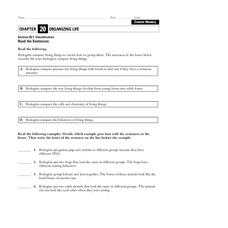Curated OER
Living it up with plants
Have kids in grades K-2 discuss how they know a tree is alive. The worksheet provides simplistic background information and an observation check list. They check off the ways that they can tell an oak tree is a living thing. Note: The...
Curated OER
Draw an Alien in Natural Habitat
Students apply prior knowledge of living things, structures of living things and how living things sense and respond to their environment. In this habitat lesson, students review the basic needs of organisms to survive. Students create...
Curated OER
Classification
In this classification worksheet, students use information describing the ways biologists compare living things to complete 4 matching questions.
Curated OER
The Martian and the Car
In this living things activity, students determine 5 things about a car that makes it seem like its a living thing and 5 things that prove it is not a living thing. This activity has 10 short answer questions.
Curated OER
Life And Death
Students participate in an interactive game to review how living things are classified.
Curated OER
It's Alive! Or is it...?
Students apply their knowledge of the characteristics of living things to unknown creatures to determine whether they can be considered "alive." They watch a Star Trek episode, then describe the characteristics of life.
Curated OER
It's Alive!! Or, Is It?
In this cell worksheet, students complete 5 word scrambles and 8 true-false questions about the characteristics of living organisms and compounds found within cells.
Curated OER
Bats About Stellaluna
Students, after listening to Janelle Cannon's picture book Stellaluna, explore a variety of living things through three distinct activities. They make a list of what they know and want to know about birds and bats. Orally and in writing...
Curated OER
Paper Towers
Students have the opportunity to use model-building as a way to help comprehend the forces and phenomena at work in the world around them. They describe gravity as a universal force that pulls everything toward the center of the earth....
Curated OER
Dig Into Soil
Young scholars discuss what is found in soil. In this science lesson plan, students observe the soil outside and write down information in regards to location, vegetation, and topography. Young scholars experiment with the soil and its...
Curriculum Corner
Living/Non-Living Objects
Which of these pictures is living? Which one is non-living? Use a set of pictures to introduce living and non-living objects to young scientists.
Curated OER
Living / Non-living
First graders shoot photographs of living and non-living things. In this living and non-living organism lesson, 1st graders discuss the attributes of living things, take digital photographs of living and non-living things, and design a...
Curated OER
In the Company of Wild Butterflies
Learners discover the life cycle of a butterfly and explain the different stages. For this exploratory lesson students watch a video and create insect art and they will get an opportunity to view live specimens of butterflies.
Curated OER
Plants and Animals: Alike and Not Alike
After reading an informative paragraph that outlines some of the differences between plants and animals, fifth graders attempt to correctly categorize 12 words in a word bank. They must put them in the plant, or animal category. This...
Curated OER
Living and Non-Living Things
In this worksheet on living and non-living things, students categorize items, cutting and pasting their pictures under the correct heading.
Science Matters
Basic Needs
Scholars take part in a grand conversation about the basic needs of living things. Working collaboratively, pupils brainstorm and identify similarities to come to the conclusion that the environment meets the needs of all living things.
Michigan State University
In Search of Life
Explore the habitats around you with an activity that takes kids out of the classroom to learn about the local variety of habitats and the living things that call them home. In small groups, scholars investigate their surroundings,...
Michigan State University
Friend or Foe?
What one person thinks is a pest may not be a pest to someone else. Here, scholars examine the characteristics of living things and pests through grand conversation and a variety of activities. Class members play a game of pest or not a...
Curated OER
Vocabulary Instructional Routine: Identify and Sort Common Objects into Categories
Kindergarteners build vocabulary by learning about categorization. They discuss the attributes of living and non-living things. As a class, they view and sort pictures into each category. They discuss the word category and what it means.
University of Southern California
What Lives In The Ocean?
One of the most diverse environments on Earth is the ocean. Young scientists explore the living things found in the ocean during an exciting seven-lesson unit. Their study includes organisms from plankton to invertebrates and vertebrates...
Curated OER
Animal Structure and Function
Take a look at the levels of organization and methods of homeostasis in living things. This instructional activity requires biology enthusiasts to list categories of animal tissues, connective tissues, and muscle tissues. It has them...
Core Knowledge Foundation
Chaos within the Living World? NOT!
What are the five kingdoms? Fifth graders engage in a series of investigations and research activities focused on the methods of classification used by scientists, as well as the language they use to describe the similarities and...
Curated OER
I Know What I Am... but, What Are You? (Classifying Living Things)
Learners examine how to classify living things by effects, environment, and activity. They explore various websites, develop a list of facts they learn about classifications, and participate in a distance online learning session with the...
Curated OER
Needs of Living Things
Students discuss and explore the needs of living things. They choose to create a slide show with captions, create a web showing the needs of one Organism using KidPix. or make picture book by hand or using Microsoft Publisher.

























